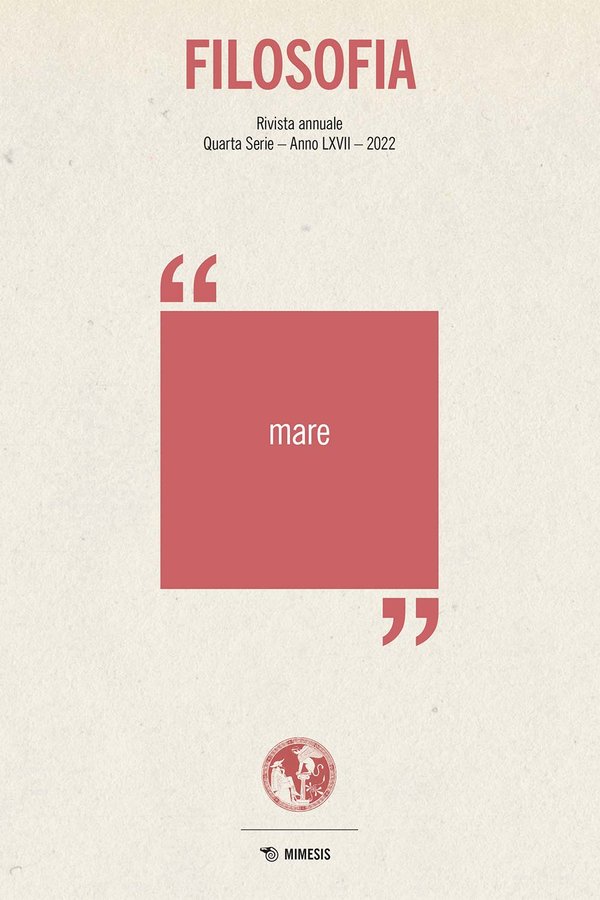The ocean: Excursion and return
DOI:
https://doi.org/10.13135/2704-8195/7241Parole chiave:
Ocean, Sea, Phronesis, OdysseyAbstract
The ocean with its coastal seas is under increasing anthropogenic pressure, severely threatening ocean health and marine life. Human dependency on and management of the ocean are disconnected, which is in part why the United Nations (UN) is launching the Decade of Ocean Science for Sustainable Development, 2021–2030 (“Ocean Decade”). Here we investigate how philosophy and literature can inspire us to change the relationship between humans and the ocean. The starting point is natural science and human exploration of the sea. Then we consider philosophy, starting from Aristotle’s forms of knowledge – episteme, techne, and phronesis – focusing particularly on phronesis, or practical wisdom. Referring to Homer’s Odyssey, we investigate the threats that the ocean may face during the UN’s Ocean Decade. From this, we identify several things that will make for a successful Ocean Decade: practical wise leadership, clear vision, societal involvement, information sharing, admitting the vulnerability of both the ocean and humans, and storytelling.
Downloads
Riferimenti bibliografici
Abulafia, David. 2019. The Boundless Sea. A human history of the oceans. Penguin Books.
Arendt, Hannah. 2018. The human condition. Chicago: University of Chicago Press.
Aristoteles. 2012. Den nikomachiska etiken. Tr. Mårten Ringbom. Göteborg: Daidalos.
Carson, Rachel. 1962/2000. Silent spring. London: Penguin Books.
Claudet, J., Bopp, L., Cheung, W.W.L., Deviller, R., Escobar-Briones, E., Haugan, P., Heymans, J.J., et al. 2020. “A roadmap for using the UN Decade of Ocean Science for sustainable development in support of science, policy, and action”. One Earth 2, n. 1: 34-42.
Cushman-Roisin, B. and Beckers J.-M. 2011. “Introduction to geophysical fluid dynamics. Physical and numerical aspects”. International geophysics series 101. Waltham: Academic Press-Elsevier.
Duarte, C.M., Augusti, S., Barbier, E., Britten, G.L., Castilla, J.C., Gattuso, J.-P., Fulweiler, R.W., et al. 2020. “Rebuilding marine life”. Nature 580, n. 2: 39-51.
Gadamer, Hans-Georg. 1989. Truth and Method, London: Sheed and Ward.
Hegel, Georg Wilhelm Friedrich. 2009. The phenomenology of spirit: (the phenomenology of mind). Tr. Baillie, James Black. Digireads.com.
Hemingway, Ernest. 1952. The old man and the sea. London: Jonathan Cape.
L. Valdés et al. 2017. IOC-UNESCO. “The current status of ocean science around the world”. Global Ocean Science Report. Paris: UNESCO Publishing.
K. Isensee. 2020. IOC-UNESCO. “Charting Capacity for Ocean Sustainability”. Global Ocean Science Report. Paris: UNESCO Publishing.
Lamb, Hubert. H. 1995. Climate, history, and the modern world. New York: Routledge. Marean, C.M. et al. 2007. “Early human use of marine resources and pigment in South Africa during the Middle Pleistocene”. Nature 449: 905-908. https://doi.org/10.1038/nature06204. Nussbaum, Martha. C. 1995. Känslans skärpa, tankens inlevelse: essäer om etik och politik. Tr. Zivkovic, Zagorka. Stockholm: Östlings bokförl Symposion.
Omstedt, Anders. 2017. “The Development of Climate Science of the Baltic Sea Region”. Oxford Research Encyclopaedia of Climate Science. Oxford University Press. https://doi.org/10.1093/acrefore/9780190228620.013.654
Omstedt, Anders. 2020. A Philosophic View of the Ocean and Humanity. Springer Nature. https://doi. org/10.1007/978-3-030-36680-3
Omstedt, Anders. 2021. “How to develop an understanding of the marginal sea system by connecting natural and human sciences”. Oceanologia. https://doi.org/10.1016/j.oceano.2021.06.003.
Pendletona, L., Evanse, K., and Visbeck, M. 2020. “We need a global movement to transform ocean science for a better world”. PNAS 117, n. 18: 9652-9655. https://doi.org/10.1073/ pnas.2005485117
Reckermann, M., Omstedt, A., Soomere, T., Aigars, J., Akhtar, N., Bełdowska, M., Bełdowski, J. et al. 2021. “Human impacts and their interactions in the Baltic Sea region”. Earth System Dynamic Discussion. https://doi.org/10.5194/esd-2021-54
Ricœur, Paul. 1988. Time and narrative. Vol. 3. Chicago: University of Chicago Press.
Roberts, Callum. 2007. The unnatural history of the sea. Washington: Shearwater Books-Island Press.
Rogers, Alex. 2019. The Deep: The Hidden Wonders of our Oceans and How We Can Protect Them. London: Wildfire.
Rossby, H.T. and Miller., P. 2003. “Ocean Eddies in the 1539 Carta Marina by Olaus Magnus”. Oceanography 16, n. 4.
Sarmiento J.L. and Gruber N. 2006. Ocean biogeochemical dynamics. Princeton: Princeton University Press.
Schlebusch et al. 2017. “Southern African ancient genomes estimate modern human divergence to 350,000 to 260,000 years ago”. Science 358: 652-655. doi:10.1126/science.aao6266. Svansson, Artur. 2006. “Otto Pettersson: Oceanografen, kemisten, uppfinnaren”. Göteborg: Tre Böcker Förlag AB.
Sverdrup, H.U., Johnson, Martin. W. and Flemming, Richard. H. 1942. The Oceans Their Physics, Chemistry, and General Biology. New York: Prentice-Hall. https://publishing.cdlib. org/ucpressebooks/view?docId=kt167nb66r;brand=eschol
von Wright, G.W. 1993. Myten om framsteget: tankar 1987-1992: med en intellektuell självbiografi. Stockholm: Bonnier.
World Ocean Review 1. 2010. “Living with the oceans: a report on the state of the world’s oceans”. Hamburg: Maribus. https://worldoceanreview.com/en/
World Ocean Review 4. 2015. “Sustainable Use of Our Oceans: Making Ideas Work”. Hamburg: Maribus. https://worldoceanreview.com/en/
Wunsch, C. 2015. Modern observational physical oceanography: understanding the global ocean. Princeton: Princeton University Press.
Wåhlin, A.K., Graham, A.G.C., Hogan, K.A., Queste, B.Y., Boehme, L., Larter, R., Pettit, E., Wellner, J. and Heywood. K. J. 2021. “Pathways and modification of warm water flowing beneath Thwaites ice shelf, West Antarctica”. Science Advances 7.
##submission.downloads##
Pubblicato
Come citare
Fascicolo
Sezione
Licenza
Filosofia applica una licenza Creative Commons Attribution 4.0 International License a tutto il materiale pubblicato.



